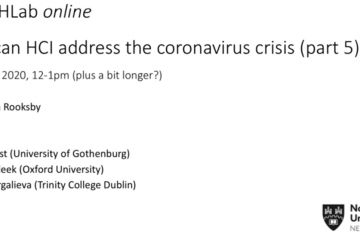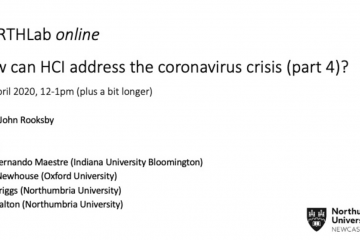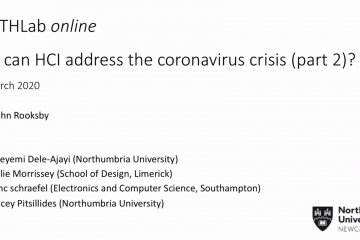Following on from Part 1 and Part 2 of our NORTH Lab online panel series, below are my notes on yesterday’s discussions, which have been probably the most thought-provoking of all for me. I personally very much resonated with the common thread throughout the speakers:
Is doing work in this space more-self indulgent than anything?
Should we be thinking more critically about the implications of our work and the long-term effects?
How do we communicate more effectively with stakeholders, actors and the public our work so that the research efforts are not forgotten, especially once we go back to normality?
Can we create a collective of knowledge and expertise to help use navigate this space so that our support can go where most needed without duplicating efforts?
Anyway, those are just my daily doubts that make it hard for me to focus and get me questioning even my own research on work-life balance and digital wellbeing. Below are my notes on the speaker’s talks, which I hope I’ve not misrepresented.
Dr Reem Talhouk (Newcastle University) – Pandemic and Protracted Conflicts: Drawing the Parallels
Reem has been doing a lot of work around refugee crisis and has drawn a series of thematic parallels with the covid-19 pandemic, particularly in the UK:
- Education – with schools currently closed or partially closed to students
- Emergency shelter – with homeless people being rehoused
- Food security – with food support being given to purchase food, e.g. food parcels and vouchers. What can we learn from digitisation of food security?
- Health – this is particularly relevant in relation to women’s heath, with shortages of midwifes or treating abortion/breast screenings as non-essential medical service which can be suspended, but also continuous access to healthcare services being limited (e.g. routine and annual cancer screenings), as well infectious disease, e.g. with prisoners for whom social distancing is not easy, especially considering how prisons are hot beds for infections.
- Protection – with gender-based and domestic violence.
Based on these parallels, it’s important to think about how we engage with interventions, given what we know about refugee crisis. The Sphere Handbook offers an interesting lens here, with principles of aid response such as dignity, rights and impartiality. More importantly, the handbook offers considerations for specific user groups, such as children, older adults, people with disabilities, etc.
If we want to have a humanitarian response, how can we respond to covid-19?
As HCI researchers, we can create a way for a transparent coordination of efforts. Here, OCHA’s Cluster Approach can be useful because it offers an example of how to coordinate efforts both at a regional and national level, in a way that avoids duplication of efforts. The approach is not based on providing technological solutions and thus it is not technology-led, but allows different stakeholders and actors to offer support and see what is needed in order to coordinate efforts and logistics. There are currently lots of platforms mapping existing efforts, but having them grouped visually Is something we could be working towards, so as HCI researchers we can have a better understanding of how where our help is most needed.
There are of course further things we can learn and consider:
- Added considerations for those who are already marginalised and being marginalised even further – for example, universal credit is now being discussed as an actual possibility. So now, how can we draw from cash assistance in humanitarian crisis? There are digitised form of aid, such as transferring money when people don’t have banks?
- Designing for the digital divide – how can we support students who don’t have access to technology, when they are being recommended to suspend their studies?
- Balancing the language of war, resilience, techno-solutionism with democracy, rights, principles and challenging the status quo – in times of emergency, immediate action is needed. However, we also need to be critical about how these decisions are being made in place and what are the long term consequences (e.g. what are the implications of using tracking technology in a post-humanitarianism world?).
One thing Reem brings our attention to is that as academics and HCI researchers looking at the role of technology we should be thinking about technology formation, but preparing for what comes after. More importantly, how do we challenge the reasons that have made this crisis possible?
So how do we move forward post-crisis? One key thing that always comes out in time of crisis is that fear and needs outweigh what you regard as security. People in crisis know they might not be fine, are being abused, but they still need to eat. Our role then suddenly becomes that of identifying such vulnerabilities and communicating them to stakeholders and the general public in order to think about how we can reconfigure digital means. For example, by thinking of how to design food security for collective action we can ensure more end users benefit.
Dr Alex Taylor (City University London) – HCI in the Pandemic
Alex’s talk brings a methodological orientation to the conversation on how we address problems in a pandemic. He argues that creative methods we use in HCI and ways of working remotely in communal and civil ways have a lot to offer here and we should perhaps be capitalising on this more. To this end, a special issue of Feminist Review, with Yasmin Gunaratnam as guest editor, is currently out and open access, offering a review of feminist methods (https://femrev.wordpress.com/2020/03/25/issue-115-on-feminist-methods-free-to-view-for-two-months/). Feminist methods are one way we can attune ourselves to the issues that Reem mentioned, as well as others.
One of the recurring themes in Alex’s research has been that of structural inequalities. This has led him to ask time and time again, what words are we making possible? How is what we think about the status quo masking those at the margins? Drawing on Naomi Klein’s work, he reminds us how the capitalistic systems in our daily lives rely on the marginalised as a necessary part of sustaining the normal. This includes exploiting gig workers, carers, cleaners, etc, and such challenges are deeply entangled in the socio-technical. In the side chat during his talk, we were reminded how the #clapforourcarers event that happened last week in the UK, while it emulated similar behaviours from other countries, it also only focused on NHS workers and ignored key workers such as teachers, delivery drivers, supermarket workers, etc., who instead were the focus of clapping in other countries.
Our society runs on some people being considered more equal than others. Even in situations where we are told how to protect ourselves, this information and solution is available only to the privileged. Having access to information, comforts, food, banking systems, remote working, citizenship, etc is something that is only available to the privileged . These ingrained inequalities and exploitations of the marginalised are not incidental, they are necessary part of society.
As such, we as HCI researchers should be asking questions about technology, questioning the redistribution of welfare (for example with ventilators) and ultimately try to address how the socio-political, socio-technical and welfare are all entangled. We need ways of understanding how the technoscience is implicated in phenomena such as deforestation, how we are creating conditions for microbes and viruses to emerge, etc.
We should be responsive and responsible for pandemic and caring for multi-species pandemic. In order to do this, we need a critical shift in thinking about the human, the natural and the overlap between these words. Alex calls for building a collective and then creating a space to act more in the long term and not just think about now. To this end, he has announced that, as one of the editors in chief for Interactions Magazine, there will be an upcoming issue on “Living in the Pandemic” with an open invitation to submit pieces.
Prof Shaun Lawson (Northumbria University) – A critical view on covid-19 responses
Last week, Derbyshire police released drone footage of people hiking and walking their dogs in the Peak District to call out these activities as being not in line with governmental guidelines of limiting time spent outside. The footage received lots of reaction on social media, split between outrage towards the police who can carry out such surveillance, and outrage towards people who are going out.
There has been lots of research in HCI on privacy and surveillance and souvillance, particularly using critical methods to unpick the implications. To this point, Shaun drew a parallel with a very similar footage produced by Joe Lindley and Paul Coulton on tracking dog walking activities as a way of denouncing perpetrators of owners who don’t clean up after their dogs, as part of a design fiction activity. And now, police forces across the country have been publishing pages to get citizens involved in surveillance activities, to call out neighbours and passers-by of any violations of governmental guidelines. Police are overstepping their authority and as this pandemic will come to an end, will these kinds of surveillance interventions also end or remain?
Researchers are trying to fight covid-19 in ways they can (have you read about the astrophysicists who tried to use magnets to deter people from touching their face?), including publishing papers, but the reaction is not always positive. Some argue that perhaps our efforts as researchers should be spent offering practical help instead. There have even been attempts Trying to gamifying aspects of this pandemic, such as the Zen.ly app owned by Snapchat, similar to Foursquare, encouraging people to stay home. When it comes to technologies such as these, how do we raise awareness and how can we be critical about approaches taken? Some in HCI have started doing this, starting from the Quantified Toilets fiction and Carl Di Salvo’s adversarial design. There are several other provocations that have been proposed, such on facial recognition as a means of demonstrating hidden implications for example in airport surveillance.
Historically, the HCI community has been the one within the broader technology community, who has railed against this stuff, but in light of this pandemic and the responses that are emerging, we should be asking what will we do afterwards, once it’s over? Taking the case of surveillance, just because we can do it, should we be going ahead? Do we just ditch all we know about trust and privacy in this current situation?
Dr Cally Gatehouse (Northumbria University) – This thing that is happening right now
Cally’s work has often revolved around ‘Staying with the trouble’, by combining from the critical and speculative design with feminist STS and positions her work in broader movement of post-solutionism in design-research practice.
By drawing on methodological tools she uses to manage ‘staying with the trouble’, she has been applying the same approaches a a way of dealing with stuff in the current pandemic:
- Events
Events are not just things that happen, but they are moments where things come together in new ways and create a new sense of the before and after.
- Provisional seriousness
In the context of participatory speculative workshops, workshops create carnivalesque uncertainty of authority, which allows to negotiate what is possible, preferable, plausible, and ____ (a 4th P I can’t remember!).
What is happening now is deeply un-carnivalesque, but we are in a temporary zone and in that, all the things we thought about as impossible are suddenly possible. As Reem highlighted in her talk, homeless people are being rehoused, universal basic income is no longer unreasonable. Of course, there are also negative examples.
Events produce events, but whether they are good or bad or ambiguous, we still need to figure out their nature, even after the situation is finished. At some point this will end and we will live in a post-covid-19 world. We will have a new sense of normal, so we need to start thinking about how we can return to this event and the things it brought out?
It might be that covid-19 will be out of sight and maybe be out of research, but not out of touch. Even though we are physical distance and creating new forms of social isolation, we’ve never been more aware in ways we are interdependent with each others.
OPPORTUNITIES TO GET INVOLVED:
- NATO ACT innovation challenges which are open to all. The call states: “this innovation challenge is seeking innovative solutions that will enable leaders, teams of first responders and information systems to identify false information and mitigate the effects of this information on generating a true common operating picture, predicting behaviours, and supporting decision making” – https://www.innovationhub-act.org/challenge-intro
- A call for innovators who can support the elderly, vulnerable and self-isolating during Covid-19 – https://techforce19.uk/
- UKRI opens a call for ideas to address covid-19: https://www.ukri.org/funding/funding-opportunities/ukri-open-call-for-research-and-innovation-ideas-to-address-covid-19/
- Not-Equal call for collaborations on key challenge areas: algorithmic social justice, digital security for all, fairer futures for businesses and workforces: https://not-equal.tech/call-for-collaborations/



0 Comments